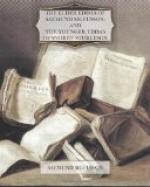57. Brand burns from brand until it is burnt out; fire is from fire quickened. Man to’ man becomes known by speech, but a fool by his bashful silence.
58. He should early rise, who another’s property or life desires to have. Seldom a sluggish wolf gets prey, or a sleeping man victory.
59. Early should rise he who has few workers, and go his work to see to; greatly is he retarded who sleeps the morn away. Wealth half depends on energy.
60. Of dry planks and roof-shingles a man knows the measure; of the fire-wood that may suffice, both measure and time.
61. Washed and refected let a man ride to the Thing,[17] although his garments be not too good; of his shoes and breeches let no one be ashamed, nor of his horse, although he have not a good one.
62. Inquire and impart should every man of sense, who will be accounted sage. Let one only know, a second may not; if three, all the world knows.
63. Gasps and gapes, when to the sea he comes, the eagle over old ocean; so is a man, who among many comes, and has few advocates.
64. His power should every sagacious man use with discretion; for he will find, when among the bold he comes, that no one alone is doughtiest.
65. Circumspect and reserved every man should be, and wary in trusting friends. Of the words that a man says to another he often pays the penalty.
66. Much too early I came to many places, but too late to others: the beer was drunk, or not ready: the disliked seldom hits the moment.
67. Here and there I should have been invited, if I a meal had needed; or two hams had hung, at that true friend’s, where of one I had eaten.
68. Fire is best among the sons of men, and the sight of the sun, if his health a man can have, with a life free from vice.
69. No man lacks everything, although his health be bad: one in his sons is happy, one in his kin, one in abundant wealth, one in his good works.
70. It is better to live, even to live miserably; a living man can always get a cow. I saw fire consume the rich man’s property, and death stood without his door.
71. The halt can ride on horseback, the one-handed drive cattle; the deaf fight and be useful: to be blind is better than to be burnt[18] no one gets good from a corpse.
72. A son is better, even if born late, after his father’s departure. Gravestones seldom stand by the way-side unless raised by a kinsman to a kinsman.
73. Two are adversaries: the tongue is the bane of the head: under every cloak I expect a hand. * * *
74. At night is joyful he who is sure of travelling entertainment. [A ship’s yards are short.][19] Variable is an autumn night. Many are the weather’s changes in five days, but more in a month.
75. He [only] knows not who knows nothing, that many a one apes another. One man is rich, another poor: let him not be thought blameworthy.




